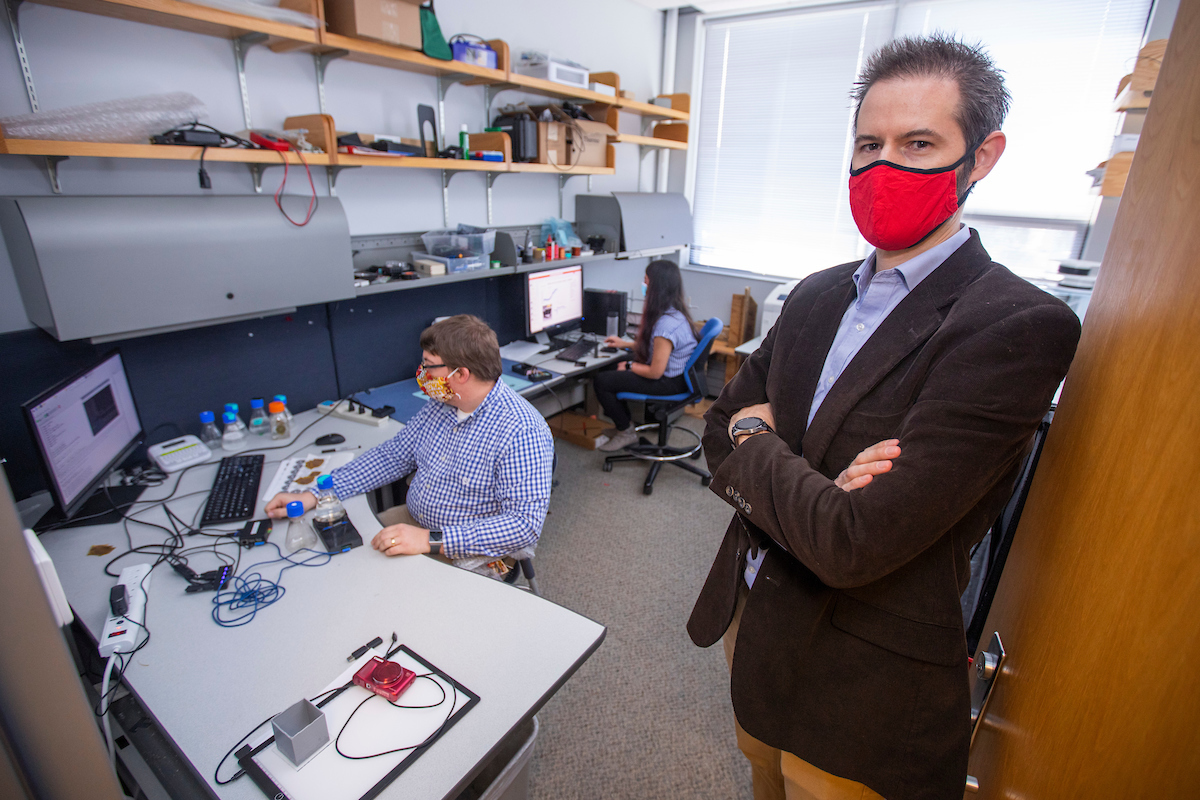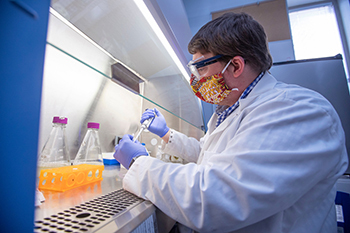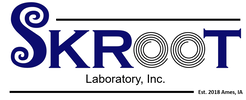
Nigel Reuel, right, and part of the Skroot Laboratory, Inc., staff -- Samuel Rothstein, left, and Charu Gupta, middle -- work in the startup's office space in the Roy J. Carver Co-Lab. Larger photo. Photos by Christopher Gannon.
AMES, Iowa – It’s necessary work for a cell factory, but monitoring cell growth in small flasks is labor intensive and risks contaminating cell cultures. It can be a bit of lab drudgery, too.
“I did this often in graduate school,” said Nigel Reuel, an Iowa State University assistant professor who recently earned tenure and was promoted to associate professor of chemical and biological engineering. He’s also the Jack R. and Carol A. Johnson Faculty Fellow.
“For fast growing types, you’d have to pull samples every 30 minutes throughout the day or for slow growing types, you’d have to come in on weekends to take measurements for a complete growth curve.
“It was completely monotonous.”

Nigel Reuel
So, Reuel and a team of his students found a way to automate that work – including sensor stickers that lab technicians can apply to the outside of flasks and other single-use bioreactors. Now a startup called Skroot Laboratory, Inc., established in 2018 and based in Iowa State’s Roy J. Carver Co-Lab on the north side of campus, is selling that technology.
Early adopter bundle packs, in fact, go for $4,950.
That’s a fairly small investment for a big and valuable industry.
“Cell factories are responsible for producing more than $150 billion worth of cell therapies, protein therapies, industrial enzymes, and small molecules each year,” company leaders wrote as part of a successful application for a $225,000 Phase I Small Business Technology Transfer (STTR) award from the National Science Foundation.
The Skroot sensor resonates, or absorbs electromagnetic radiation, at a specific frequency. As cells grow in the reactor, there is a change in permittivity which modulates this resonant frequency. A custom, wireless reader placed near the reactor takes real-time measurements of cell concentration and pushes notifications for cell feeding and harvesting. This is all done without contacting cell cultures or changing reactors.
That means no more monotonous measurements and weekend lab visits. (Thus the company’s name, Skroot, an anglicized version of the Polish word for shortcut, a word Reuel remembered from living in Poland for two years as a church service volunteer.)
In addition to cutting out tedious lab work, says the project summary, “This could enable substantial ‘big data’ improvements for bioprocess developers, clonal selection, and small batch production.”
From “skunk works” to startup
The big idea for the technology, as it says on the company website, is all about, “Helping make medicine.”
“Research is good,” Reuel said. “But it’s even better if it leads to contributions that can do something to better the world.”
He knew automated culture monitoring was something he wanted to use in his own lab, a lab dedicated to developing biosensors, biomaterials and custom tools for synthesizing and characterizing sensors and materials. He also thought it might be useful in a lot of biology labs producing cell- and protein-based therapies.
So he set two students – Adam Carr and then-undergraduate Yee Chan – on a “skunk works” project to tinker on the side and see if their resonant sensor platform was up to the task.
Initial tests were a success, so Reuel worked with the Iowa State University Research Foundation to protect the intellectual property and license it for the company he was putting together to mature and improve the platform.
It turns out Reuel knows a lot about the business of startups: He started a company called Volvox Biologic Inc., as a graduate student at the Massachusetts Institute of Technology, he worked as a technology transfer consultant and then he worked for DuPont as a research investigator and then a corporate technology scout with marching orders to go out and “find interesting things.”
All that know-how helped land grants and awards to launch Skroot – including National Science Foundation STTR Phase I (led by Charles Glatz, University Professor Emeritus at Iowa State) and Small Business Innovation Research (SBIR) Phase II (led by Samuel Rothstein, now a scientist with Skroot) awards. The company has also won support from the Ames-based Ag Startup Engine, the Iowa Economic Development Authority and part of a state grant of federal CARES Act funding to support development of a nanovaccine against the virus that causes COVID-19.
All that support helped create four full-time jobs, with more hires on the way.
Improving, selling and testing
On a recent work day in the company office, Rothstein said a major goal for the week was to assemble a sensor reader for a company to try. There was also work in the wet lab to test and analyze the viability of mammalian cells under different growing conditions.
Big-picture tasks include improving consistency and quality control during production of the sensor stickers, developing readers that can simultaneously monitor multiple cell cultures and working with company scientists to reliably provide the data they need.
Rothstein, who earned his doctorate in chemical and biological engineering from Iowa State in 2020 as part of Assistant Professor Thomas Mansell’s research group, said he’s optimistic about the company’s progress. Just landing a two-year, nearly $1 million SBIR Phase II award is a good sign.
Another good sign is there are now actual products for sale.
“We have a ‘Store’ page on the website now,” Rothstein said. “We’re looking for early adopters of our technology. We want them to buy our sensors and test them on different cultures.”
And look here, the company’s website says in a bright red box, Skroot sensor stickers are now on sale.
Contacts
Nigel Reuel, Chemical and Biological Engineering, Skroot Laboratory, Inc., 515-294-4592, reuel@iastate.edu , reuel@skrootlab.com
Mike Krapfl, News Service, 515-294-4917, mkrapfl@iastate.edu
Quick look
Nigel Reuel and a team of his students have developed technology that helps laboratories use cell factories to produce cell- and protein-based therapies, industrial enzymes and small molecules. A startup -- Skroot Laboratory, Inc. -- is selling the technology from its incubator space in the Roy J. Carver Co-Lab on campus.
Quotes
“Research is good. But it’s even better if it leads to contributions that can do something to better the world.”
Nigel Reuel of chemical and biological engineering and Skroot Laboratory, Inc.
----
“We have a ‘Store’ page on the website now. We’re looking for early adopters of our technology. We want them to buy our sensors and test them on different cultures.”
Samuel Rothstein of Skroot Laboratory, Inc.
The Skroot team
- Nigel Reuel, founder and president
- Samuel Rothstein, scientist and leader of the SBIR Phase II award
- Cameron Greenwalt, software leader
- Charu Gupta, wet lab leader
- Adam Rice, data science leader

